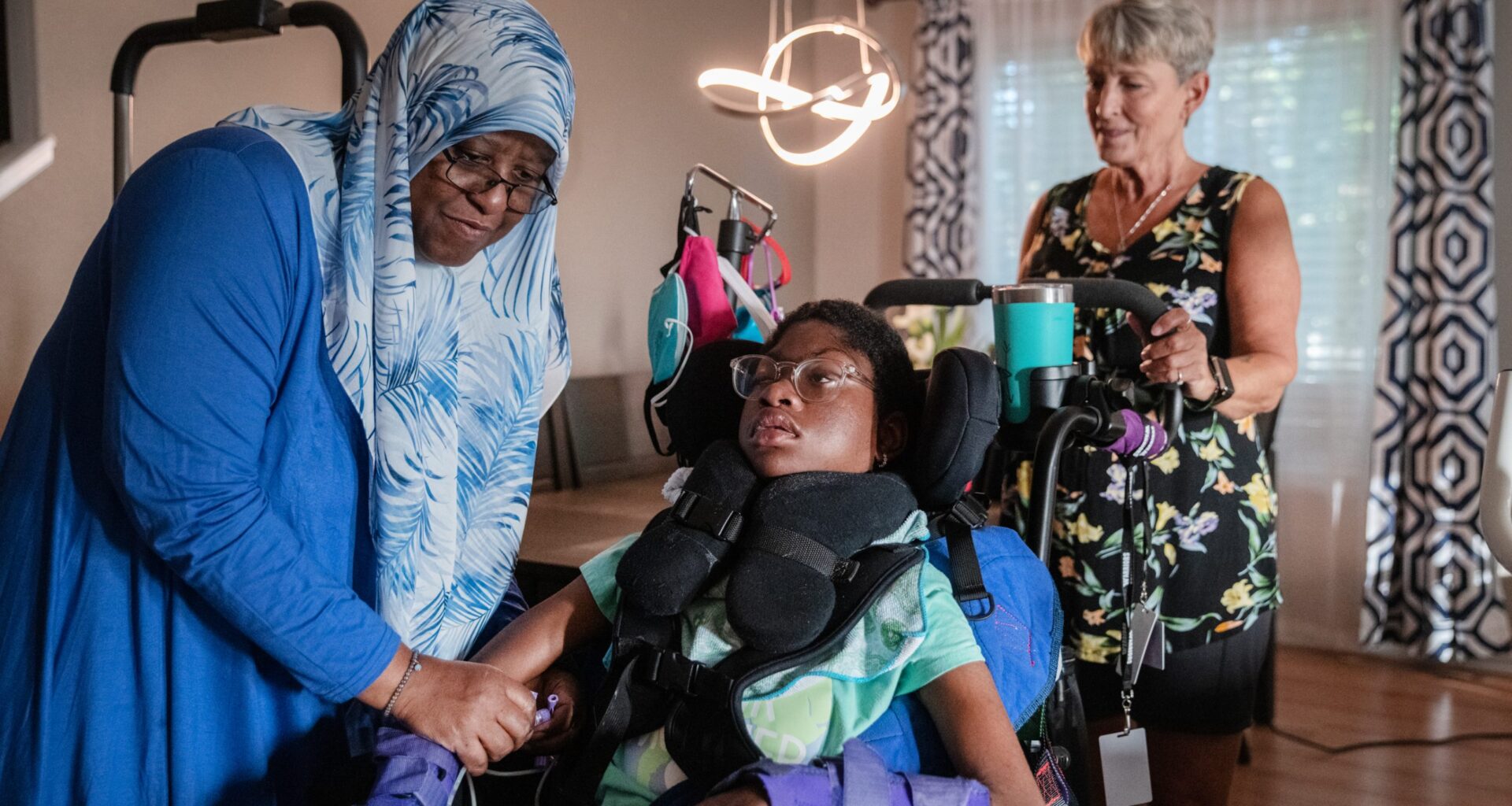Kathy Fieber cannot rest. When she has taken her eyes off her son in the past 25 years, he has eaten the foam that covered the springs on the trampoline, ingested the carpeting and swallowed a necklace.
“Imagine taking care of your 2- or 3-year-old for the rest of their life, or your life, whoever lives the longest,” the Littleton mom said this week. “If you are the first one to go, who is going to do that for you?”
Fieber’s son, Ben, has Down syndrome and autism, is losing his eyesight and does not speak. Her husband works normal day hours while she works as a caterer on weekends, which means both spend almost all of their time working or watching their son, who is 25.
They get by because Ben receives what are called “long-term services and supports” from the Medicaid program, intended to help adults with severe disabilities live in group homes or with family instead of institutions. Depending on the severity of needs, family caregivers in Colorado are paid about $30,000 to $100,000 to provide round-the-clock care for their adult children through the state-federal program.
Those rates, though, are about to get slashed by up to 10%.
The program is one of many taking a hit as federal lawmakers, and now state budget writers, hack away at Medicaid spending that is gobbling up money for education, transportation and the rest of the services the government provides. Gov. Jared Polis’ plan calls for increasing Medicaid spending next fiscal year by nearly $300 million — less than half of the $631 million it would take to keep offering the same programs.
Spending on Medicaid, the insurance program for people with low incomes or disabilities, now makes up one-third of the entire state budget. And the cost of community care for people with developmental disabilities has outpaced others. Program costs rose 44% in the past five years, including $600 million in investments aimed at increasing wages for caregivers, including parents.
The rate change for family caregivers is expected to save about $2.4 million, state officials said. About 8,600 people with developmental disabilities in Colorado are receiving Medicaid funds to support their care, including in host homes or individual homes with caregivers.

They’ve spent their entire lives fighting for their kids, and this is just yet another area where they’re not feeling seen or appreciated. I cannot justify paying a higher rate.
— Bonnie Silva, director of community living
“They’ve spent their entire lives fighting for their kids, and this is just yet another area where they’re not feeling seen or appreciated,” said Bonnie Silva, the Colorado Department of Health Care Policy and Financing’s director of community living. “It really does just break my heart.” Yet, Silva said, she “cannot justify paying a higher rate.”
The rate change has caused outrage among family caregivers who say their choice to take care of their adult children instead of hiring workers or sending them to an institution is collectively saving taxpayers “thousands of dollars per hour.”
In recent weeks, parents collaborated to write a white paper about the support for people with developmental disabilities and gave a presentation about their concerns to state Medicaid officials and the governor’s office.
In their report, family caregivers accused the Colorado Department of Health Care Policy and Financing, or HCPF, of circumventing public input by calling the change a policy “alignment” rather than a rate cut. They also predicted the cuts will result in more people with disabilities in hospitals and institutions.
The department “chose this vulnerable population for this cut because we are small in number, we do not have powerful state lobbyists, and we love our family members … and want them to be well cared for and safe,” they wrote. “This strategy is not only illegal, it is shortsighted, and will result in greater Medicaid expenditures in the long term.”
The cost of residential care in an institution is four times as expensive as a family member providing care for an adult child with high-level needs, which can include feeding tubes, diaper changing and aggressive behavior. Care in one of Colorado’s regional centers for people with developmental disabilities costs Medicaid $1,080 per day, or nearly $400,000 per year.
“We all know that the state needs to cut funding of programs,” Fieber said. “We are OK with something, but 10% is a lot. Why are we balancing the budget on the most needy people? If we cut care to these adults, in the short run, they will probably save money. But in the long run, they will not.”
“We are saving the taxpayers thousands of dollars every hour.”
Fieber and other parents caring for their adult children use some of the funding to pay for respite care, which costs $25 or $30 per hour. If they can no longer afford respite caregivers, and they work all day and night, it will lead to mistakes in care and more days in the hospital, they said.
Michelle Dumay, in Denver, takes care of her 18-year-old daughter Fatima, who uses a wheelchair and has a temperature dysregulation disorder that triggers seizures.
She pays a babysitter for about seven hours per week, and Fatima has 40 hours per week with a nurse, but for the remaining 100 hours in a week, Dumay is on her own.

When I go in the bathroom, I’m listening for her to have a seizure. When I’m showering, I have her next to me.
— Michelle Dumay, mother
“Someone must be looking at her 24/7,” Dumay said. “When I go in the bathroom, I’m listening for her to have a seizure. When I’m showering, I have her next to me. It is exhausting.”
Even if Dumay wanted to send her daughter to a group home, there are very few options. Group homes often will not accept people who need such a high level of care, she said.
“You can’t find it because it doesn’t exist,” she said. “I’d love to clap my hands and make it so but literally the reason we are caring for our community members, our family members, our loved ones is because there is not a place for them. It doesn’t exist.”
“We are saving the taxpayers thousands of dollars every hour.”
Medicaid officials take blame for “confusing messaging”
The Colorado program for adults with developmental disabilities was established in 1983, designed to help people live in their communities instead of institutions. Until 2008, the program paid only nonrelatives for the care they provided to people in host homes and individual homes. That changed with the Family Caregiver Act, which authorized parents to provide care that was reimbursed by the state-federal program.
Rates are based on a person’s needs, and a daily rate is paid to the caregiver but does not cover the housing itself. Family caregivers are considered independent contractors and work 24/7 with no paid time off.
Family caregivers have been paid the same daily rate as those paid for people with disabilities who live at home and have staff who come in and care for them in shifts. Going forward, the family caregivers will get paid the same as host homes, which take in a few people with disabilities and provide care for the group. For some families, the change will mean a 10% cut in their income.
In announcing the change, Medicaid officials said family caregivers, “due to conflicting department guidance,” have been paid a higher rate than they should have and that the state is changing the rules to “clarify” its policy.
Some family providers have been paid at the higher rate, while some have been paid at the lower, host home rate, said Silva, the HCPF community living director. To further confuse the issue, the agency posted a memo in May on its website — then retracted and apologized for it — that directed family members to be paid the higher rate.
“We’re part of the problem in terms of the confusion,” Silva told The Colorado Sun this week. “And so that doesn’t really lend towards trust in the community.”
The division isn’t doing an across-the-board rate cut because it won’t slow the spending in the long term, Silva said. “Our trend will continue to move at a rate that we can’t afford, and we’re going to continue on this hamster wheel,” she said. “And so the reason that we are taking the actions that we’re taking is that those are the areas where we have a trend that is not sustainable.”
“They are just so tired”
Deana Cairo, a mom caring for two children with disabilities, asked state officials in a recent meeting if they were “seriously taking the position that you all didn’t know for a decade” that families were getting paid the wrong rate. Families don’t do the billing. A family caregiver has a provider agency, which bills the state and takes a cut of the reimbursement rates. The Medicaid division has to approve the request.
“The fact of the matter is they knew it and they desired it,” Cairo said. “This is a significant and deep cut for which they haven’t done the legal analysis. This is going to push people who are marginalized over the edge.”
When Cairo’s daughter turned 18, she interviewed nine agencies to set up services. All of them said they would struggle to find her daughter a host home because of her care needs, Cairo said.
The rate change for family caregivers comes at the same time the state plans to end its policy that children with disabilities who received the highest level of Medicaid services, called “extensive supports,” automatically get the adult version of those services. Those children had been able to bypass the waitlist — which is about eight years long — upon turning 18.
 The Community Living Alternatives’ Specialized Service in Aurora supports individuals with intellectual and developmental disabilities. Program activities include gardening, computer skills, music, dance, cooking, arts and crafts, exercise, meditation, yoga and more. (Olivia Sun, The Colorado Sun via Report for America)
The Community Living Alternatives’ Specialized Service in Aurora supports individuals with intellectual and developmental disabilities. Program activities include gardening, computer skills, music, dance, cooking, arts and crafts, exercise, meditation, yoga and more. (Olivia Sun, The Colorado Sun via Report for America)
“It’s fantastical to think that a child on the extensive services waiver becomes 18 and poof, there’s no incredible need,” Dumay said. “It defies logic.”
Fieber said she and her husband will manage the rate cut and find ways to decrease household spending, but she’s hurt and angry that Colorado isn’t sticking up for families like hers.
“We can’t pay someone else to do this job. Because they won’t,” she said. “There are people out there that would do that. They are burned out. They are just so tired, because they never get a break.”
Type of Story: News
Based on facts, either observed and verified directly by the reporter, or reported and verified from knowledgeable sources.

